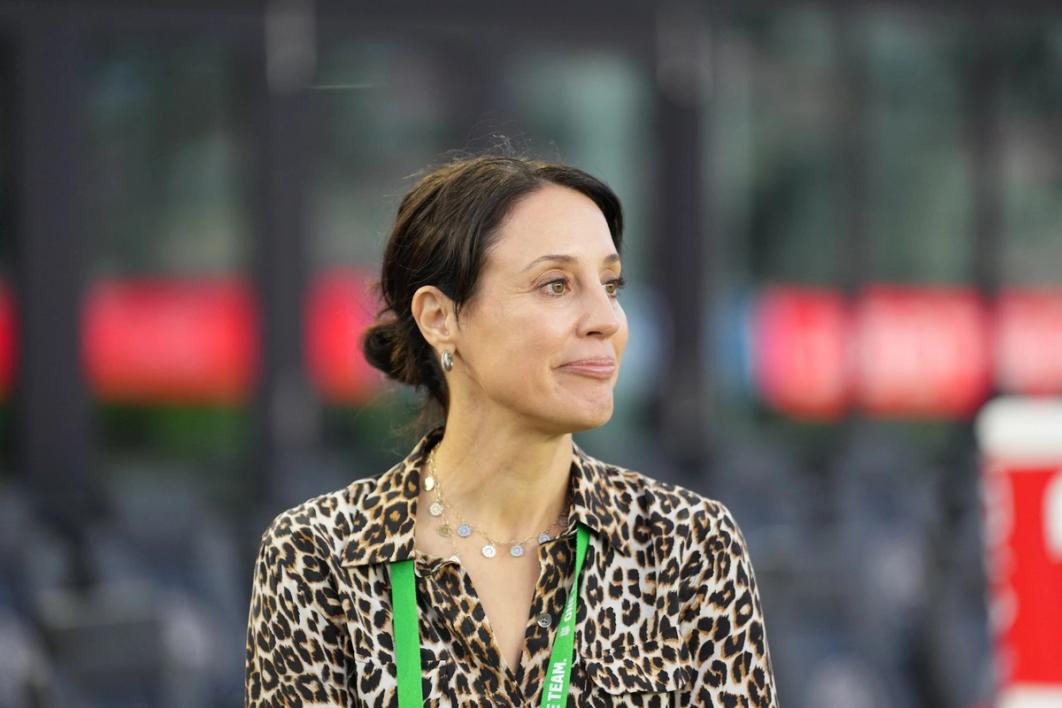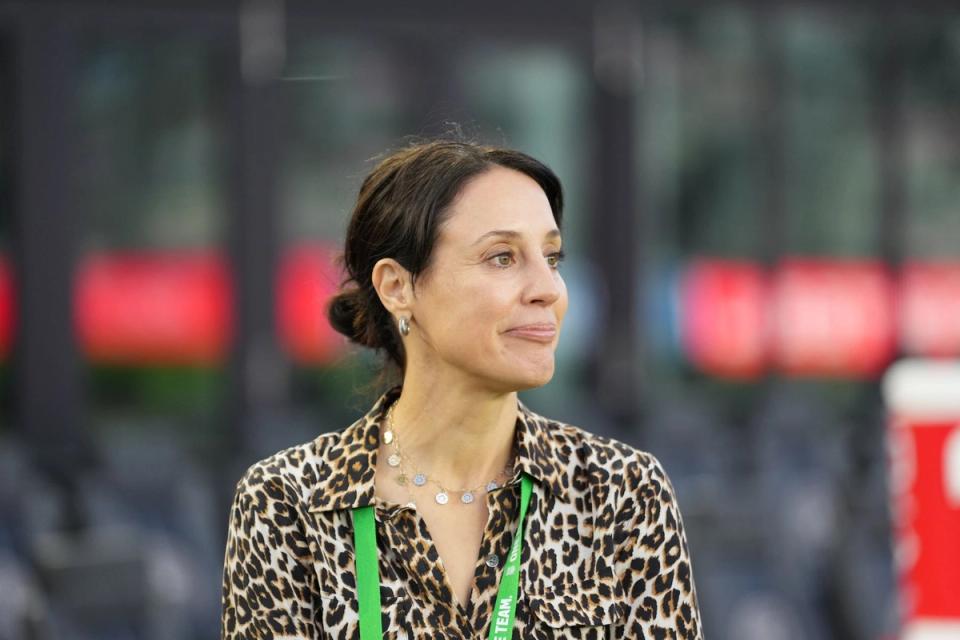Checking In With USWNT General Manager Kate Markgraf
Kate Markgraf is charged with overseeing the U.S. Women’s National Team, but her job responsibilities are far more vast and varied.



Kate Markgraf played in three FIFA Women’s World Cups, won one -- she was the least experienced starter on the most historic 1999 WWC Champions -- and put on a U.S. jersey 201 times. She famously scored her only USWNT goal in her 192nd cap, converting from the penalty spot while, unbeknownst to her, pregnant with twins.
But it was not Markgraf’s offensive prowess that made her one of the best players in U.S. history. A gritty defender with tremendous toughness into the tackle on the ground and in the air, she had underrated savvy with the ball, excellent recovery speed, superb tactical positioning and was a cerebral defender, preferring to use her smarts to thwart attacks, but was never averse to putting her body on the line if needed.
Markgraf had a monumental day on Monday, Dec. 5. In the morning, she became just the fourth women’s soccer player to earn the NCAA Silver Anniversary Award. The awardees, all 25 years removed from the end of their collegiate careers, were honored for their outstanding collegiate and professional achievements. That evening, live on ESPN Networks at halftime of the NCAA Women’s Soccer Championship Game, she was told by her former teammate Julie Foudy that she been elected as part of the 2023 class to the National Soccer Hall of Fame.
Markgraf twice came back from childbirth to represent the USWNT and when she retired in 2010, embarked on an interesting post-playing life that included soccer broadcasting for ESPN, FOX, NBC and the Big 10 Network as well as academic work that earned her two graduate degrees: a Master’s in Kinesiology and a Master’s in Educational Psychology from the University of Wisconsin-Milwaukee.
Her research on elite athletes and the influence of Grit, a psychological metric predictive of success in elite domains, was the first of its kind and was published, with her as the co-author with her advisor, in the top Sport Psychology Academic Journal, the Journal of American Sport Psychology.
In August of 2019, Markgraf was named to a first-of-its kind post for U.S. Soccer as the Head of Women’s Soccer and General Manager of the U.S. Women’s National Team. She took on the responsibilities of working with the head coach in creating, executing and monitoring technical plans for the USWNT and, in massive undertaking, all U.S. Women’s Youth National Teams, both short term and long-term. These plans are aligned with U.S. Soccer’s Sport Development Programs while maintaining, creating and building partnerships and networks among the American and global soccer community.
Markgraf is also charged with overseeing the technical and administrative staffs for all teams, managing the day-to-day activities around the teams, leading the planning of National Team activities, helping implement High Performance programs and representing U.S. Soccer and the Women’s National Team at various events around the country and the world. Beyond the senior team, she is responsible for influencing the development of women’s soccer within the Federation and the managing of the overall technical plan for the Women’s National Team program which include the hiring of Youth National Team coaches and staff.
As the calendar prepares to turn from 2022 to the FIFA Women’s World Cup year of 2023, Markgraf is hard at work in all aspects of her job.
Kate Markgraf: “Well, of course there are differences being on the management side, but there are actually a lot of similarities to being a multiple World Cup participant and what I'm doing now. The reality is that every single time I played for our country and got to wear that crest, I was always concentrated on my teammates, my friends, my family, and obviously representing the United States and females. And my whole goal as a player was to connect everyone, make sure everyone could do their job to the best of their ability, and as a leader, anticipate any issues. So, it’s very similar to my job now in that I try to proactively manage anything that we can see and then be prepared with a structure in case things that do come up, because we must always expect the unexpected.”
KM: “In 2023, I have no doubt that the Women's World Cup will see the most successful on and off field performances for teams, for countries and for the sport thus far in history. Not just because the attention and everyone focusing on our players, but also because of the other teams and having people learn about other players across the world. The game is globalized and it’s accessible. This World Cup is going to amplify where the sport is at now and these players are going to move it off forward in a big way, regardless of their affiliation or the crest that they wear.”
KM: “I was very excited to take the role as head of women's football and honored because it meant that you had someone purely focused on the women‘s soccer ecosystem, which is constantly evolving and developing. So, having someone purely focused on that for the first time ever, hiring all the coaches, making sure our environment is what we want it to be, making sure from Under-14 on up, we are now building in steps and progressions so that they can just keep moving forward and not having to re-learn under a new coach. I think in the next eight to ten years, you're going to see the benefits of all this hard work and from everyone who is participating in this process.”
KM: “With the Youth National Teams, my first main responsibility is hiring coaches that want to help build players. Coaches who know that it’s not ‘my team,’ it’s our Under-14 team. If we come with that collective sense, then we can also ask the ecosystem to be collaborative – we should have a symbiotic relationship as they develop the players that we select. When the players are with our YNTs, can we encourage players to be hungry and equip them with the tools to on their journey to reach their potential? Can you start to build that steel backbone that you need to be elite? And you do that by stress testing, by exposing them and giving them the tools to face challenges - whether that's playing tough opponents, whether that's putting them in fitness tests, whether that's teaching them parts of the games that perhaps they don’t have to do at their club games, defend and track back, or build out of the back, turn under pressure, break down bunkers, etc. The international game is so different than the club and college game so it’s our opportunity to show a different layer of women's football to them.”
KM: “Leading up to the past three years since 2019 and we're one year out from the World Cup, we wanted to make sure we had a bigger player pool and a player pool that was more tested -- especially with our less experienced players. And we wanted to put them in environments that the outcome mattered, and then put them in situations and games where the performance mattered, because the margins of error between the top teams are so small now. Everyone is fast. Everyone is physical. Everyone is fit. But are you relentless? Are you trying to solve problems with others to unlock defenses? Are you clean in the box? Are you clean in defending? Are you always locked in mentally to put your body on the line in a tackle? Are you focused on every dead ball – because as we have seen, from our Olympics, the Euros, our Fall 2022, and the Men’s World Cup – those details matter. We have been tested. And if you're not struggling or if you're not having challenges, I would be concerned. So, what didn't kill us, which it didn't, made us stronger. Look at our second half against Germany in our last game of the year. Look at our past six weeks. Look at the players that stepped up. I think we're well positioned to keep improving. If so, then we will be prepared on our journey to attack the World Cup.”